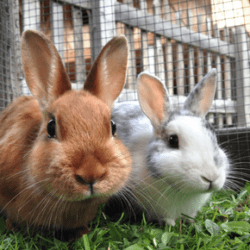How to spot a lonely rabbit with James’ advice
As a general rule, most rabbits do better in pairs – discover why in our article created especially for National Pet Month and learn what signs to look for in a lonely bunny.
Remember that Estcourt Vets’ team of friendly vet nurses are always happy to give advice on rabbit care.
Ask our Vet Nurses about rabbit care
Working out if your rabbit could be lonely
As sociable animals, rabbits appreciate constant companionship and in the wild you would rarely find a rabbit alone. To mimic their natural behaviour, it is always a good idea to keep your pet rabbit with a friend to avoid them feeling lonely and unhappy.
Our Vet James Carpenter advises that if you notice any of the below, it may be time to think about introducing your rabbit to a new companion.
- Lonely rabbits may overeat, pull at their fur, or become hyperactive and/or angry. Signs of this could be them chewing at rugs or carpets, gnawing furniture, or destroying toys in their hutch.
- If you notice your rabbit biting you, nudging you, or attempting to dig on you, these are other signs that they could be feeling isolated and want more attention.
- On the other hand, if they start to act withdrawn and do not respond as normal when you attempt to interact with them, this is also a sign they may feel lonely.
Remember: if you are worried your rabbit may not be feeling themselves, it is always worth seeking the opinion of your vet so they can rule out any underlying medical conditions.
Contact us to book an appointment
What to know about getting a companion rabbit
The vet nurses at our Devizes practice recommend matching your rabbit with another of the same age and approximately the same size. Rabbits also like to be paired with a member of the opposite sex but remember to make sure both are neutered. Otherwise, you could end up with a few more rabbits than you originally settled on!
When you introduce them, try to do it somewhere neutral so your original rabbit will not get territorial. This will help to avoid fighting. It is essential that you do not try to rush this step; just take your time and allow your animals to adjust at their own pace.
If you spot them snuggling each other, nuzzling, and rubbing noses, this is a good sign that they have bonded and will be happy to live together full time.
If your rabbits are chasing or fighting one another, James says this is a sign they are struggling to bond. Try changing their environment, providing lots of toys and hiding houses during the introduction, and petting them simultaneously for up to 15 minutes. If you are still struggling to encourage them to bond, then chat to one of our vet nurses who can advise further.
What if I can’t have another rabbit?
Although our vet nurses believe the best companion for a rabbit is another rabbit, plenty of pet owners simply do not have the time, space, or budget for a second animal. With the correct care and attention, it is possible to keep just one rabbit. Here are some tips recommended by our vet nurses to ensure your rabbit is happy and doesn’t feel lonely:
- Show your rabbit plenty of affection with soft rubs on their back, cheek, and forehead.
- Make sure they’ve always got plenty of fresh food, water, and enrichment toys to chew or scratch.
- Rabbits need at least one hour a day out of their hutch – why not set up a run with plenty of space and toys in the garden or set up an indoor rabbit play pen. Rabbits love to play so get down to their level and help them to dig, knock things over, toss things in the air, or even invest in a rabbit safe ball pit or sand box.
For more advice on rabbit health and companionship, don’t hesitate to contact our vet nurses who will be happy to answer your questions.
Ask our vet nurses about rabbit care
< Back to articles
 Estcourt Vets Devizes
Estcourt Vets Devizes